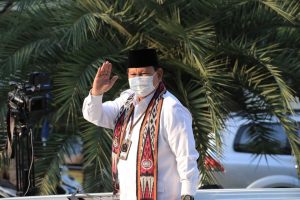Indonesian Defense Minister Prabowo Subianto has signaled his intention to run again for the country’s presidency in 2024, as the competition to succeed President Joko “Jokowi” Widodo continues to heat up.
Prabowo, a former son-in-law of President Suharto and a hardline general under his New Order dictatorship, registered his Gerindra party on Monday and said he would run if nominated by its members, Reuters reported. “That’s a sacred task, to devote to and serve the people. Of course, I’ll accept it well if I’m nominated,” the 70-year-old said.
A run in 2024 would be a case of third time lucky for the gruff former general, following his defeats by Jokowi at both the 2014 and 2019 presidential elections. After the latter election, he was then welcomed into Jokowi’s coalition as minister of defense for his second term.
The Jakarta Post reported on Monday that Gerindra is likely to seek a coalition deal with the National Awakening Party (PKB), Indonesia’s largest Muslim-based party, in order to nominate Prabowo. Prabowo is currently well placed, with a recent survey by the local pollster Suara Politik Publik showing that the defense minister had the highest electability rating of the 10 most likely presidential candidates.
Should Prabowo finally prevail in 2024, it would follow a recent regional resurgence of authoritarian old guard figures, represented most notably by the thundering victory of Ferdinand Marcos Jr. at this year’s election in the Philippines, creating rhetorical complications for Western nations that view Indonesia as a potential bulwark against growing Chinese influence in Southeast Asia. Prabowo is credibly believed to have been responsible for a host of gross human rights violations in the dying days of the New Order government, and prior to his appointment as defense minister, was barred from visiting the United States on human rights grounds. (He unsurprisingly denies the claims.)
Human rights legacies aside, Prabowo’s declaration suggests that even 18 months out from the election, the political maneuvering and jostling among Indonesia’s political elites is moving into an advanced stage. In an article this week, Alexander Arifianto of Singapore’s Nanyang Technological University noted that Prabowo has four main competitors at this early stage of the race: Central Java Governor Ganjar Pranowo; Jakarta Governor Anies Baswedan; West Java Governor Ridwan Kamil; and Puan Maharani, the speaker of the Indonesian house of representatives.
Arifianto notes that in order to nominate a presidential candidate in Indonesia, political parties must have secured at least 20 percent of seats in the lower house or 25 percent of the total vote – hence Gerindra’s need to form a coalition with PKB in order to nominate Prabowo.
This raises the question of which nominee is likely to be put forward by Jokowi’s party, the Indonesian Democratic Party of Struggle (PDI-P) – the only party with enough seats in parliament to nominate a presidential candidate without another party’s support.
As Jefferson Ng wrote in The Diplomat recently, the PDI-P’s “electoral strategy and choice of its presidential nominee will have a large effect on the trajectory of the 2024 presidential elections and what is likely to happen during the next presidential term.” At the moment, there are two likely nominees: the energetic, popular Java Governor Ganjar Pranowo, and the less popular but politically well-connected Puan Maharani, the daughter of current PDI-P chairman and former president, Megawati Sukarnoputri.
This increasing competition raises the question of what will happen to Jokowi’s capacious parliamentary coalition after the next election. During his eight years in power, Jokowi has broadened his political tent to such an extent that it now includes seven of the nine political parties represented in parliament, as well as all of the contestants of the 2019 presidential election – the first Indonesian administration in which this has been the case. Indeed, such is the breadth of his coalition that some senior officials mooted the possibility of Jokowi staying on as president, either by delaying the 2024 election or amending the Constitution to allow him to run for a third term.
So far, Jokowi has not declared a successor – and given the number of political allies and coalition partners readying to loose their hats into the ring, it would not be surprising to see him remain aloof while the political process plays out. In all likelihood, 2024 will see a race between a range of candidates who can all claim credibly to represent a continuation of Jokowi’s legacy.

































